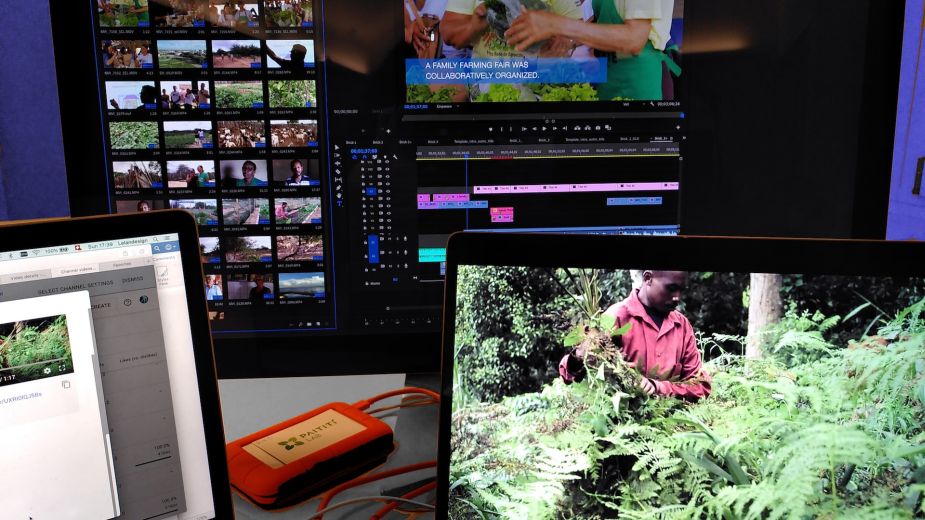
Scientists as storytellers
Moving images give weight and make content alive but they can also make vulnerable. Researchers, who can polish texts and graphics to perfection, suddenly appear approachable, emotional and authentic in front of the camera. The possibilities for correction are minimal.
From January 2020 onwards, researchers from the r4d programme will put selected aspects of their projects into the spotlight. At regular intervals, some 25 short videos will be shown online, portraying how their research relates to the Sustainable Development Goals. The first series of video clips shows why Brazilian smallholders prefer to sell their seasonal vegetables on their own market independently of wholesalers, what effects gold mines have on the health of the local population, or how Tanzanian farmers are organising themselves against the invasion of foreign plants on their pastures and fields.
Rewarding effort for dialogue with new target groups
The stories of the Digital Storytellers offer unknown insights into some of the r4d research projects. “It was only after watching the finished video clip that many researchers realised that the effort was worth it,” says filmmaker Sonja Schenkel. The social anthropologist and co-founder of the Paititi Lab in Zurich is specialised in science filmmaking and has supported the researchers from the first script to the editing of the raw material and the final production. In this way, she consciously promotes the use of audio-visual methods in research. “Especially in transdisciplinary research projects, the medium of film opens up completely different communication possibilities,” explains Schenkel. She speaks of as a filmmaker with the heart of a scientist. Or a scientist with the mind of an artist.
Exchange on complex issues
The potential is far from exhausted. This type of documentation takes as much time as writing a scientific publication. Researchers are slowly beginning to recognise the value of a film for their work, says Schenkel. The feedback from the researchers is extremely positive once the video clips are finished. The audio-visual documentation enables the exchange of complex issues with additional target groups. Especially in the exchange with decision makers, the medium film is very helpful, says Sonja Schenkel. Stimulating discussion outside the universities and transferring it to other contexts is easier with moving images than with other communication channels usually managed by the scientific community.
Film as a research method
With the camera in hand, the roles of the scientists and protagonists are no longer so clearly defined. “The audiovisual documentation of transdisciplinary research is an ideal working tool,” says Sonja Schenkel. The production of a film can support and structure research within a project and can promote the exchange between different participants in a constructive way. However, it is still rare for researchers to deal with film as a research method and to do it requires a great deal of openness.
E-learning material for support
In the Digital Storytellers project, an e-learning was developed as a support, presenting the basics of filmmaking briefly and simply. However, filmmaker Sonja Schenkel is somewhat disillusioned about the use of the online course. The limited time is a big challenge for many of the participating researchers. Only a few of the 50 participants had worked through the e-learning material consistently. “The differences in the quality of the material are striking,” says Sonja Schenkel. The introductory information, short explanatory videos, checklists and exercises are still available on the Digital Storytellers website e-learning suite.
The Digital Storytellers project is part of the synthesis and communication work of the r4d programme. All video clips have in common that researchers from projects of the r4d programme have worked together with stakeholders to address local challenges. In this way, the r4d programme supports communication about research that seeks concrete solutions and improvements in the living conditions of people in Africa, Latin America and Asia.
The video clips will be published on the YouTube channel of the r4d programme from 20 January 2020 onwards. All video clips focus on the Sustainable Development Goals of the 2030 Agenda for Sustainable Development of the United Nations.
Sources
Contacts:
Sonja Schenkel
Paititi Lab
sonja.schenkel@paititi-lab.org,
The Digital Storytellers Synthesis Project,
https://paititi-lab.org/blog-digitalstorytellers/
Carmenza Robledo
r4d programme synthesis coordinator
carmenza.robledo@gmail.com,
http://www.r4d.ch/r4d-programme/synthesis